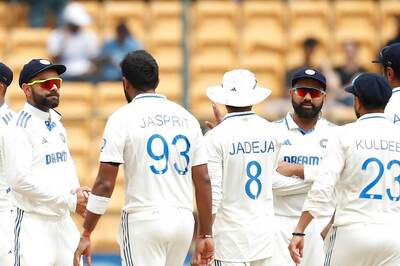
views
Bangalore: The clock's ticking away for the judgement day for Tamil Nadu Chief Minister J Jayalalithaa in her crucial disproportionate assets (DA) case. Final arguments by the defence began on Thursday morning, 18 years after the first FIR was filed against Jayalalithaa by the Tamil Nadu vigilance department.
The case, originally filed in 1996, has seen innumerable delays because of associated cases and petitions being filed over the years. It pertains to allegations that Jayalalithaa accumulated properties worth Rs 66 crore, disproportionate to her known sources of income. The case was filed as Jayalalithaa had, at the time, declared that she would only take a salary of Re 1 every month. She was also arrested a few months after the FIR was filed in September 1996, and spent a few days in jail. Most of the properties and documents pertaining to these were seized during this time.
The Disproportionate Assets (DA) case was shifted to a special court in Bangalore by the Supreme Court in 2003. This was on a petition by DMK leader Anbazhagan that an unbiased judicial proceeding was not possible as Jayalalithaa had returned to power at the time. Since then, 259 prosecution witnesses and 99 defence witnesses have been heard in the case.
Arguing in the TN Chief Minister's defence, advocate S Kumar told the special court that, starting from the filing of the FIR, the case smacked of being politically motivated. "The investigation, instead of being objective, is laced with political conspiracy... the (then DMK) government directed the FIR to be filed and there was an extraordinary extent to deny Constitutional protection to the accused (Jaya)," he said.
He alleged that the Investigating Officer allowed all television channels entry into her home to film their work, besides allowing the leak of a letter given by Jayalalitha to him while she was in jail - where she requested him to give her one of her watches during her stay in jail, as she was in the habit of checking her watch often.
Describing this as "terribly hurting" and the "unkindest of all," Kumar said that the IO was yet to explain fully how the letter - written by Jaya in her hand-writing to him - could reach the media.
The defence arguments for the other three accused in the case will follow after arguments by Jayalalithaa's lawyers conclude - Jaya's close aide Sasikala Natarajan, her foster-son VN Sudhakaran, and Sasikala's neice J Ilavarasi are the others accused in the case.
Jayalalithaa too had been summoned to answer questions related to the evidence against her. In 2011, she had attended court to answer over 1,300 questions posed to her by the judge.
The case later ran into some controversy after noted Karnataka advocate general BV Acharya quit, and another special public prosecutor Bhavani Singh was appointed. Questions had been raised in the Supreme Court over Singh's appointment too, and he had even been fined for delaying the case at different junctures.
Singh has now concluded the prosecution's arguments, while there had been more delays in defence arguments. It finally began on Thursday, only after strict orders from the Supreme Court. A team of six lawyers from Tamil Nadu has been handling the defence of the case.
Just on Wednesday, the special judge John Michael Cunha had imposed fines of Rs 50,000 on each of the five companies - RiverWay, Lex, Meadow Agro, Ramraj and Signora - for trying to delay the process yet again. The companies had filed a petition that they had nothing to do with the case, and Judge Cunha dismissed their plea.
Cunha has earlier personally examined properties seized from Jaya's house - including 880 kgs of silver, 28 kg of gold, 750 pairs of shoes, 10,500 saris, 91 watches and other valuables.
Jaya's lawyers have usually taken the stand during the witnesses' questioning that accumulation of these assets were unknown to the chief minister herself, but could have happened by other directors in companies where she was a partner.
Politically, Jayalalitha has just proved her popularity, recently winning a dazzling 37 of 39 Lok Sabha seats in Tamil Nadu. The outcome of this case, however, will be critical, in light of the Supreme Court's orders on politicians who have been convicted in criminal cases. Personally, this case - the last of the corruption cases against her - is reminder of an uncomfortable past that she is struggling to put past her now.
This is the last stage of the judicial process. After final arguments by the defence lawyers - which, lawyers caution, could take anything from two weeks to two months or more - it's left for the judge to reserve a date for spelling out his verdict.
####

















Comments
0 comment